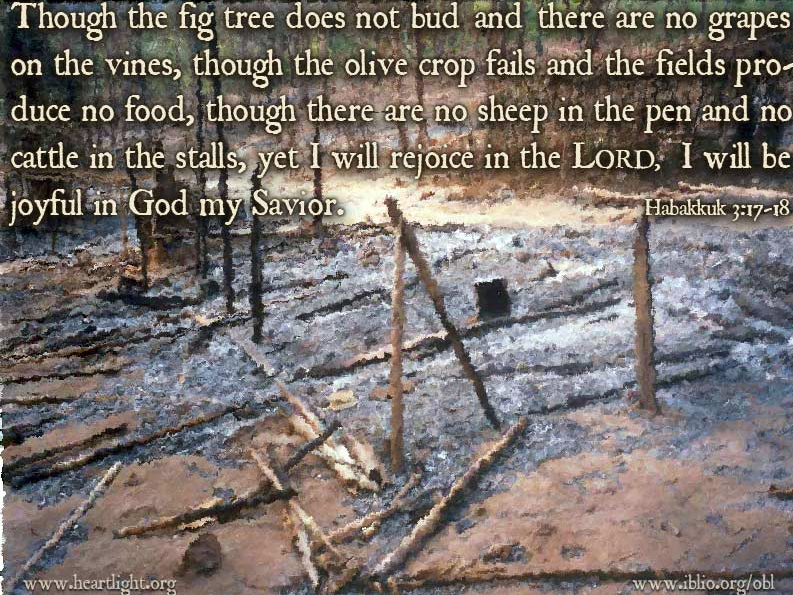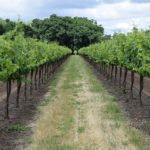
Several years ago, when I participated in Bible Study Fellowship, I was introduced to the book of Habakkuk, often called the questioning prophet. And that is what impressed me about Habakkuk; he was not afraid to ask God questions….
Those big WHY questions.
Until then, I believed (mistakenly) that we were not to ask God the big WHY questions—asking why indicated that I did not trust God or I was not accepting His plan for my situation at that moment in time.
Through my study of Habakkuk, praise God, I learned that God encourages the questions when asked by those humbly seeking help or understanding. The problem lies in what we do with God’s answers; do we accept or resist, demanding more information – disguised by another question.
We see in our subject passage that Habakkuk moves past his questions, that he accepts what has happened and says: Yet I will choose to rejoice in the Lord; I will choose to shout in rejoicing and triumph in the victorious God of my salvation!
What is Habakkuk’s trial? What is he facing? Let’s see what we can learn from Habakkuk!

What is the problem that Habakkuk faces in Chapter 3, verse 17?

His fig trees have no blossoms,
nor are there any grapes on the vines.
 The olive trees have not produced olives,
The olive trees have not produced olives,
and his fields have grown no vegetables.
He also discovers that his sheep and cattle have disappeared.


Remember that the nation of Israel was primarily an agricultural economy. Most people lived off the land – growing crops and raising livestock. Consider the problem that Habakkuk was facing: no figs on his trees, the olive crop has failed, no food for his family in his fields, and on top of that, his flock has been scattered, and there are no cattle in the stalls. Now that is a predicament! His farm is a mess, and his family is facing sure poverty or even death!
I did not realize that it takes 3 to 5 years to bear fruit for the specific fruits mentioned, making it a long-term time commitment. The farmer prepares the soil, plants the crops, and gives them the water and nutrition they need. By preparing and caring for his crops during the growth cycle, he expects and requires a good return for his hard work. These fruits would be sold to provide his livelihood.
The day for harvesting has arrived. But as the farmer walks through his fields, he does not see what he expected. His trees and vines are not producing fruit. The figs are not even blossoming! The big question – Why are they completely barren. Even the vegetables he planted provided no food. It is not just a lousy crop – it is no crop whatsoever.
Imagine walking through your fields, expecting a harvest, but there is nothing. The magnitude of the disaster becomes more evident, causing panic. How will there be enough food to feed his family in the coming year? How will he repay the debt he owes?
His solution: I will sell my sheep and my cattle to get us through this unexpected catastrophe. Going to the sheep pens and the cattle stalls, he finds nothing. Every animal is gone; all have disappeared.
The trial Habakkuk is describing has happened without any warning; it was sudden and severe. The causes of this disaster cannot be seen.
 There are no answers to the questions of “why?” Or “how?” Or “why me?”
There are no answers to the questions of “why?” Or “how?” Or “why me?”
But maybe you are not a farmer, and perhaps it isn’t easy to wrap your head around this moment in Habakkuk’s life. Today in our time era, it may be more like this:
Though my salary never arrives,
and I am fired suddenly from my job,
though my bank account was emptied through a scam
and the overdue notices begin to arrive,
though my refrigerator is empty
and there is no food on the table…
For me, it was more like this in the past month:
Though I paid a $3500 repair bill on our car to find that a wasp nest was causing the problem,
though the refrigerator no longer works and must be replaced,
though Mel has difficulty remembering how to put on his coat…
Some trials are short-term, but others are long-term. It is easy to tell someone “everything will be OK” or to quote Scripture to them like a robot.

Habakkuk’s solution is found in verse 18: “Yet I will choose to rejoice in the Lord; I will choose to shout in rejoicing and triumph in the victorious God of my salvation!”
We can ascertain by his response that he knew he was not in this trial alone. He knew where to turn for help and strength.
“The Lord God is my strength, my source of courage, my invincible army; He has made my feet steady and sure like hinds’ feet and makes me walk forward with spiritual confidence on my high places of challenge and responsibility.” Habakkuk 3: 19
His response reminded me of James 1:2-4: “Consider it nothing but joy whenever you fall into various trials. Be assured that the testing of your faith through experience produces endurance leading to spiritual maturity and inner peace. And let endurance have its perfect result and do a thorough work so that you may be perfect and thoroughly developed in your faith, lacking in nothing.”
When we face trials, we may complain instead of seeing the good in them. All problems have a purpose – to produce endurance or perseverance. 1 Peter 5:10 tells us, “after you have suffered for a little while, God will Himself complete, confirm, strengthen, and establish you, making you what you ought to be.”
 What are you facing? What sudden and unexpected calamity has come your way? Where do you turn? What do you say to yourself? I have come to believe that the most important words we speak are the words that we speak to ourselves.
What are you facing? What sudden and unexpected calamity has come your way? Where do you turn? What do you say to yourself? I have come to believe that the most important words we speak are the words that we speak to ourselves.
Here are a few of my favorite verses to help me stay connected with God so that I do not begin to complain or murmur but allow God to work out His plan in my life.
“For I the Lord your God keep hold of your right hand; I am the Lord,
Who says to you, ‘Do not fear, I will help you.’” (Isaiah 41:13)
“The Lord is on my side; I will not fear. What can mere man do to me?” (Psalm 118:6)
“The Lord is my light and my salvation—Whom or what shall I fear?
The Lord is the refuge and fortress of my life—Whom or what shall I dread?” (Psalm 27:1)
“So we take comfort and are encouraged and confidently say, “The Lord is my Helper in time of need, I will not be afraid. What will man do to me?” (Hebrews 13:6)
“Nevertheless, I am continually with You; You have taken hold of my right hand.” (Psalm 73:23)
“Do not fear, for I am with you; Do not be afraid, for I am your God. I will strengthen you. I will also help you, and I will also uphold you with My righteous right hand.’” (Isaiah 41:10)


Nicely said and a good reminder that God is faithful and he is near to all who draw near to Him. So reassuring to know he holds my hand and yours. I agree we need to speak the right words to ourselves in truth and grace.
Thank you Neva.